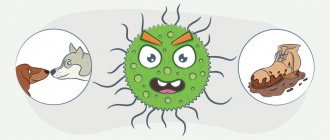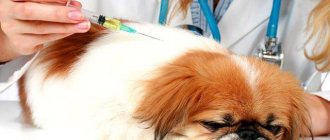- Dogs
| Data left by users (City, cost) | |
| Kamensk Uralsky | 1000 |
| Shadrinsk | 1000 (It's not expensive) |
In many countries, vaccination of dogs is considered a necessary condition for keeping them . Exhibitions, moving, taking pets abroad - all this requires the animals to have vaccinations and a properly issued veterinary passport.
This passport must contain information about the breeder, the owner of the dog, the names of the animals, and its breed. Be sure to indicate age and color. The veterinarian must include in the passport the series number of the administered vaccine, its name, dose and date of vaccination, and put the organization’s stamp and his seal. Only if you have a properly issued passport, permission to export a pet is issued. However, such permission will not be issued if less than one month or more than one year has passed since the dog was vaccinated. The export permit has a validity period of three days.
Of course, the main function of this procedure is to prevent infectious diseases. Such as Canine Rabies, Distemper, Parvovirus Enteritis in Dogs, etc.
Vaccination of pets is a very important event that should never be ignored. Veterinarians often have to deal with cases where it was necessary to euthanize a dog. If vaccinations had been done in a timely manner, there would not have been such a sad outcome.
Vaccination of puppies. Rules
There are general rules for vaccinating pets that must be followed by everyone without exception:
- Firstly, vaccination can only be done if the puppy (dog) is completely healthy;
- Secondly, at least 10-12 days before vaccination it is necessary to carry out a deworming procedure, since the presence of helminths in the animal’s body provokes a decrease in immunity, making the vaccination less effective;
- Thirdly, it is undesirable to carry out this procedure (vaccination of puppies) during the period of change of baby teeth: 3-7 months.
We also recommend reading about vaccination of puppies in Wikipedia, the free encyclopedia in the Diseases section.
Restrictions after vaccination: walking, swimming, etc.
Every puppy has what is called an immune gap period. It lasts 2 weeks. This is the time between when the antibodies obtained from mother's milk stop acting and before the formation of one's own protective forces after the first vaccination.
During this period, the risk of infection remains high. Therefore, a quarantine is introduced for 2 weeks, during which it is prohibited:
- take him outside;
- contact with other animals;
- underfeed or overfeed;
- overload the dog;
- wash the dog (bathing is allowed no earlier than 3 days after the manipulation);
Also avoid hypothermia, overheating, being in drafts or stuffy rooms.
You can cheat a little about walking. If the dog lives in a private house with a fenced area, he is allowed to go out into the yard or onto the lawn after just a few days.
Walking within the city is also not strictly prohibited. The main thing is to avoid contaminated places, not to contact other animals and carry the baby in your arms to clean clearings.
The choice of whether and when to walk the puppy remains with the owner. It is not recommended to carry the baby because his immune system is weakened after vaccination. But he also needs to be accustomed to the street, relieve himself outside the home and socialized.
Vaccination scheme
Next, we’ll figure out how often vaccinations against rabies and other diseases are given. The first vaccination is given to the puppy at approximately two months of age. After three months, repeated revaccination is carried out. You should not vaccinate your dog earlier, because the puppy’s body still contains a large amount of antibodies that were obtained in the early years of its life with its mother’s colostrum. Gradually, this amount of antibodies decreases - and then the introduction of a vaccine may be permissible.
In the future, in order to maintain the immunity of the puppy/dog, repeated vaccination is done once a year. It is especially important to vaccinate a puppy against rabies from the age of four months, then repeat this vaccination every year in order to strengthen it.
At the same time, the puppy is given a balanced diet containing the required amount of vitamins and minerals. For ten days after vaccination, hypothermia or overheating is not allowed, and unnecessarily long trips should not be included. It is also worth observing the condition of the puppy, assessing how well it responds to the vaccination, and how well the puppy is doing after vaccination. These questions are much more important than how much vaccination costs. But they also pay attention to the latter.
Are there legally required vaccines?
Each state has its own laws governing how dogs can be vaccinated against rabies. Some areas require annual rabies vaccination; other countries require vaccination every three years. Currently, throughout the modern world, vaccination of dogs against rabies is a requirement by law and state. Be sure to keep proof of your dog's rabies vaccination in the veterinary passport.
When to start vaccinating
Until the age of two months, dogs have immunity acquired through mother's milk; your pet should not be vaccinated before this period. When he gets older, his immunity becomes weaker, then the first vaccinations are given. It is worth considering that by the age of 16 weeks, dogs already begin to change their teeth; it is necessary to vaccinate your pet before this period. If you vaccinate your pet during a tooth change, when the body is weakened, the animal will not be able to cope with the microdose of the pathogen contained in the vaccine and will become seriously ill. To ensure that the pet pleases its owners with its health and good mood, vaccination of puppies at two months of age is the best time to strengthen the immune system.
Re-vaccination of dogs is necessary based on the breed, the general health of the pet and the instructions available for each individual vaccine. The veterinarian will accurately determine the optimal period of revaccination. The last vaccine is given before the age of one, after a complete change of teeth.
Price issue
Now let’s look at how much a vaccination costs on average. It is important to understand that prices are very indicative and vary greatly depending on which clinic they are performed at. Other factors also play an important role, such as what kind of vaccination is used, imported or domestic, and whether the injections are given at home or outside the home.
Below is the approximate cost for metropolitan veterinary hospitals. In the provinces, prices need to be reduced by at least about a third.
- Why does a cat need a mustache?
- Rescue dogs
- Hypoallergenic cats
- Why does a cat need a tail?
- Chinchilla
- Dog breeds
- Vaccination with a domestic vaccine at home (usually the Multakan or Biovac vaccine) can cost 1,000 rubles or more.
- Vaccination with an imported vaccine, such as the Vanguard vaccine, Nobivac, etc., carried out at home, can cost up to about one and a half thousand rubles.
- If you do not vaccinate an animal against rabies, distemper, etc. at home, but take it to a clinic, this automatically reduces the cost of the procedure by approximately 500 rubles.
Each region will have its own price for the procedure, just as each clinic will vary its prices. But this is the approximate cost.
We will give the average prices for dog vaccination in Moscow. As a rule, in the regions the cost of this service is 20-30% lower
- Vaccine BIOVAC - DPAL
Russia
Plague, parvovirus enteritis, inf. hepatitis, parainfluenza, leptospirosis
1200 rub.
- Multikan-6
Russia
Plague, parvo- and coronovirus enteritis, inf. hepatitis, leptospirosis
1700 rub.
- Multikan-8
Russia
Plague, parvo- and coronovirus enteritis, inf. hepatitis, leptospirosis, rabies
2200 rub.
- Nobivak DHPPi, Lepto
Holland
Plague, parvovirus enteritis, inf. hepatitis, parainfluenza, leptospirosis
1700 rub.
- Eurikan DHPPi + 2LR
France
Plague, parvovirus enteritis, inf. hepatitis, parainfluenza, leptospirosis, rabies
2200 rub.
- Hexadog
France
Plague, parvovirus enteritis, inf. hepatitis, parainfluenza, leptospirosis, rabies
2200 rub.
- Duramun MAX-5 L/4L
USA
Plague, parvo- and coronovirus enteritis, inf. hepatitis, leptospirosis
2500 rub.
- Vanguard 7
USA
Plague, parvovirus enteritis, inf. hepatitis, parainfluenza, leptospirosis
2300 rub.
- Nobivac Rabies
Holland
Rabies
500 rub
Possible side effects
Almost all puppies tolerate vaccinations well.
During the first 2–3 days, a decrease in appetite and increased drowsiness are sometimes possible.
In extremely rare cases, due to individual intolerance to the components of the vaccine, an allergic reaction may develop, manifested by itching, vomiting, diarrhea, swelling of the face, and difficulty breathing. These conditions require immediate medical attention.
Where can I get a free vaccination for my dog?
No matter how much the owner loves his pet, he does not always have the funds to purchase expensive vaccines. Yes, of course, you can save money and purchase a domestic complex vaccine or drugs intended to prevent only certain diseases, but this will not reduce the cost much.
This is why many owners are looking for where they can get their dogs vaccinated for free, and there are quite a few such places. In particular, state veterinary clinics provide free vaccination of animals. However, there are a couple of points to consider before contacting establishments of this kind.
Firstly, often free vaccination of dogs is carried out exclusively against rabies, since this disease is also transmitted to humans. Secondly, most often this service is provided free of charge only in those areas that are considered distressed in terms of the spread of rabies. Therefore, it is unlikely that you will be able to get a full range of vaccinations completely free of charge.
However, state veterinary clinics are also an excellent place where you can try to get other vaccinations, since there are practically no various kinds of mark-ups “for and so on.”
Of course, you should not expect a high level of service, as in any other government agency, but you will pay exclusively for vaccination, and in most cases you will be offered the most effective and affordable drug. Thus, even if you do not get completely free vaccinations for your dog, you will save a lot of money.
Advantages of visiting the Vetlife clinic
The Vetlife Clinic provides specialized care for pets in Moscow. With us you can get diagnosed and treated, as well as use other veterinary services in one place. The center is equipped with modern equipment and its own express laboratory. This makes it possible to begin treatment for your pet immediately.
All drugs used in our clinic are approved for use by Rosselkhoznadzor. The list of drugs used for vaccination in our clinic is published in the price list. The cost of vaccinating a dog depends mainly on the drugs used and can range from 1210 to 1320 rubles.
If you still have questions about vaccination or need help selecting a drug, you can make an appointment with a veterinarian from the clinic administrator.
Go to full price list
House calls - convenient and reliable
Nowadays, puppy vaccination can be done at home. This service includes:
- Calling a veterinarian to your home.
- Examination of the animal.
- Consultation regarding upcoming vaccination.
- Registration of the relevant document (veterinary passport).
The veterinarian will outline the vaccination procedure in detail. As a rule, vaccinations are carried out in the following order:
- At the age of 2-3 months, dogs are vaccinated against plague and parovirus enteritis.
- After changing baby teeth, they are vaccinated against rabies.
- At six months of age, dogs are vaccinated against hepatitis, parainfluenza and leptospirosis.
Vaccination of a puppy is a necessary and important procedure. Typically, how much a puppy's first vaccination costs can depend on various factors:
- Selected vaccination time (remember that some veterinary hospitals are open 24 hours a day).
- Place of vaccination (usually, calling a veterinarian to your home costs slightly more than delivering a puppy to a veterinary hospital).
- A company that produces a vaccine against a particular disease.
Thus, the cost of the first vaccination can vary between 1000-2000 rubles.
Video
When should you do it and why?
The vaccination schedule for each dog is developed individually. After purchasing a puppy, you need to show it to a veterinarian. He will examine the animal and determine when and what vaccinations to give.
Vaccination schedule by age
The approximate vaccination schedule is as follows:
- 7-8 weeks
– the first complex serum against canine distemper, parvovirus, adenovirosis, leptospirosis, parainfluenza is administered;- 12 weeks
- second vaccination with the same serum that was used the previous time, at the same time an injection against rabies is given;- 6-7 months
– revaccination against distemper, parvovirus, leptospirosis, adenovirosis, parvovirus and rabies;- at the age of 12 months
- the last comprehensive vaccination, after which the dog is vaccinated every year.
The diseases against which vaccinations are most often given are indicated. But sometimes they may include sera from other viruses. It all depends on the epidemiological situation in a particular region.
Regardless of the place of residence and the breed of the dog, be sure to receive a rabies vaccine. This is the only vaccination in the Russian Federation, the availability of which is regulated by law.
The first vaccine against the rabies virus can be delayed up to six months if the owner is sure that the dog will not come into contact with other animals.
It is important to administer the serum before the teeth change, as some drugs change the color of the enamel. Subsequent injections are made after all crowns have completely erupted.
You cannot shift the schedule drawn up by the doctor: shorten or increase the time frame. Immunity will not develop or will not be fully formed. The exception is if the puppy gets sick on the eve of the clinic visit. Then the procedure will have to be postponed.
In exceptional cases, 4-month-old puppies are vaccinated again. The need arises if the baby has not developed immunity after the 1st and 2nd vaccinations.
It doesn't matter what breed the puppy is. Whether it is a large Labrador, German Shepherd or Husky, or a small Pomeranian, Chihuahua or Yorkie, the volume of vaccine is the same for everyone. Each ampoule contains the required amount of weakened or killed viruses.
However, it is worth remembering: only a veterinarian gives the injection. It is not recommended to buy and administer the vaccine yourself - a non-specialist may violate the rules for storing and administering the drug.











